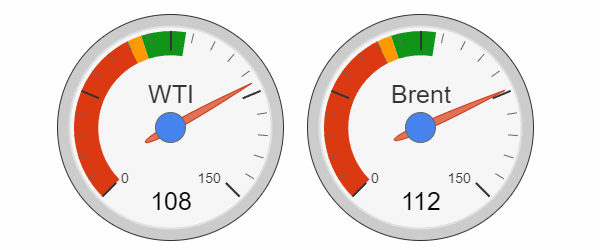The price of crude oil did not spike in the wake of the Russian Victory Day parade on Monday, in stark contrast to media speculations about declaring all-out-war against Ukraine.
The combination of the impressive military marches and display of the latest military hardware, including the dreaded ICBMs is nothing new; Russians have been sticking to this theme for decades.
As the theatrics of the parade died down, in the absence of any factor that could potentially exacerbate the current crisis, especially in the energy sector, the crude oil prices subsided slightly, leaving it at the usual fulcrum of supply and demand.
Although the West wants to send a clear signal to Russia with an outright ban of oil and gas, there are effective currents that hinder the progress on this front: the latter stem neither from emotional sentiments nor ideological loyalties; there are genuine grievances over the supply of oil and gas, if a total ban comes into effect.
Japan, for instance, admitted at the weekend that it cannot get onboard at short notice, citing its inability to find substitutes. Hungary and Slovakia, two countries of the EU, have already said they have no option, but to take the commodities from Russia in the foreseeable future. Even Germany finds it difficult to turn its back on Russian gas as quickly as the US wants it to do.
India and China, meanwhile, show no sign of slowing down on going on the buying spree, especially when crude oil is offered at heavily discounted prices; most of Asian countries and African countries are on the same wavelength when it comes to Russian fuels.
With the revival of the JCPOA, 2015 Iranian nuclear deal, in the perpetual doldrums, there is no sign of Iranian crude oil returning to the international markets through legitimate channels. Iran, however, does not show any sign of curtailing the production, implying they still can sell it and earn revenue.
In inverse proportion to the hope of Iranian contribution to the crude oil markets fading, the US exerted enormous pressure on Saudi Arabia, the de factor leader of the OPEC+, to increase the production in order to bring down the crude oil prices, but to no avail; only thing that the cartel offered was a modest daily increase, citing years of lack of investment as the possible cause.
The US did not hide its displeasure at the Kingdom, a long term ally: at first, it removed the Patriotic missile batteries from Saudi Arabia last year, despite the daily Houthi missile and drone attacks on its oil facilities, leaving the former in a difficult position to defend itself; the US is now trying to threaten the entire OPEC+ as a whole for not lowering the prices of the essential commodity with the NOPEC bill; if it is approved by President Biden in its last legal process, it will have serious repercussions for the cartel in the long run.
In proportion to the gaping holes in the supply chain, even coal, often branded as the 'dirtiest fuel' in the net-zero jargon is slowly making a triumphant comeback with a distinct image makeover.
Australia, for instance, reports a heightened demand for its coal from Asia in general and LNG, liquefied natural gas, from Japan and South Korea in particular: Australian producers say the demand has gone up exponentially.
All in all, Ukraine crisis, once again, explicitly shows that fossil fuels are here to stay for decades to come, despite the aspirations to the contrary.








